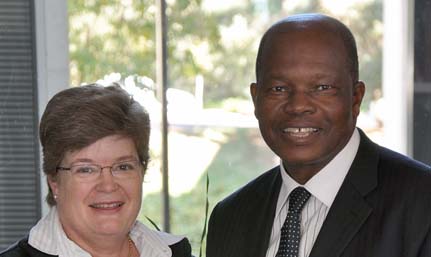Latest News Archive
Please select Category, Year, and then Month to display items
![]()
After South Africa’s battle with the record-breaking drought of 2015, Prof Andries Jordaan from our Disaster Management Training and Education Centre for Africa(DiMTEC) saw room for improvement in dealing with this kind of disaster.
Drought impact
Commercial farmers who are usually net exporters of food crops and communal farmers who own the bulk of the country’s livestock, were all hit hard in 2015. Most of the latter had no resources to spare as the drought progressed. The concern about the drought’s impact on the country’s food production and availability resulted in a joint goal of preventing food scarcity during future droughts.
Prof Jordaan’s visit to the National Drought Mitigation Center (NDMC) in Lincoln, Nebraska, in the US, several years ago prepared him to better equip communities in South Africa to deal with drought situations. “I recognised that in spite of the impact DiMTEC has been able to make on disaster preparedness, a gap remained in disaster response in South Africa.”
Sharing knowledge
In August this year Prof Jordaan again visited the NDMC. This time he requested a few key players in South Africa’s agriculture and disaster response communities to join him. With him were Janse Rabie, head of Natural Resources at AgriSA, a nonprofit organisation that functions as an interface between the government and about 28 000 South Africa farmers, and Moses Musiwale Khangale, director of Fire Services for the South African Ministry of Cooperative Governance and Traditional Affairs.
The South African delegation met with and learnt from climatologists, geospatial technologists, and outreach and planning analysts.
Valuable advice for businesses in difficult times
2013-04-15
|
 |
|
Prof Helena van Zyl, Director of the Business School, and Dr Reuel Khoza.
Photo: Stephen Collett
15 April 2013 |
Dr Reuel Khoza, Chairman of the Nedbank Group, shared the group’s valuable rules for managing a bank in difficult times in an MBA lecture on the Bloemfontein Campus. Dr Khoza is a visiting professor at the UFS Business School.
He focused in the lecture on the group’s business and leadership model and highlighted some do’s and don’ts:
- Do not surprise your stakeholders on the downside – communicate transparently, particularly when there is bad news.
- Retrenching staff to contain costs should be a last resort – the damage to corporate culture from retrenchments is immense. Follow and support your customers – get as close to them as possible because business changes slowly, but customer behaviour can change in an instant.
- Integrated central capital and funding management.
- Entrench well-established reporting, KPIs and measurement systems.
- Ensure strong independent risk management.
- Manage your cost base – anticipate downturns and re-base your costs to avoid crisis-cost management.
- Take advantage of opportunities – an economic downturn creates a situation where valuations fall and assets are sold off, which can be a great opportunity for acquisitions.
- Keep innovating – innovation does not have to be a costly exercise, as the right culture can promote and encourage experimentation and collaboration.
- Whatever you do – avoid a price war, as expedient pricing decisions may hurt the business in the longer term.